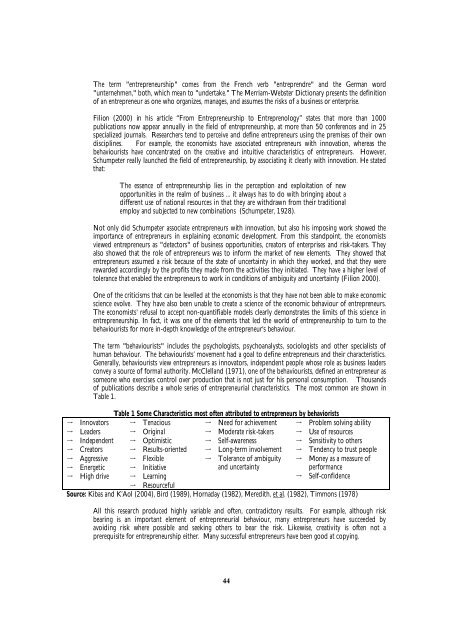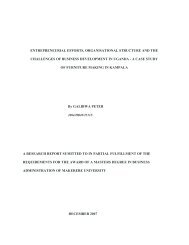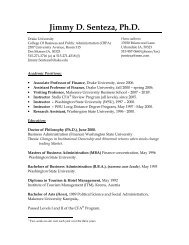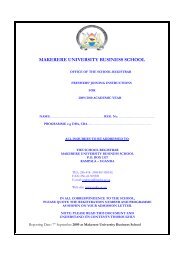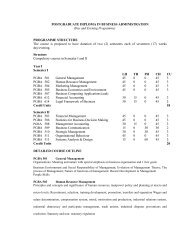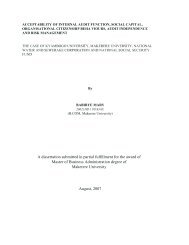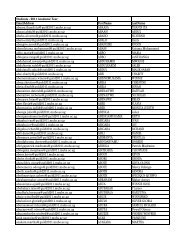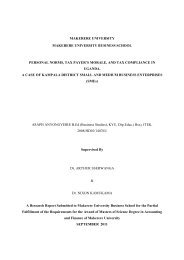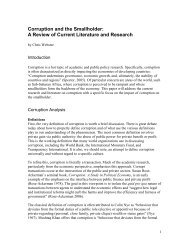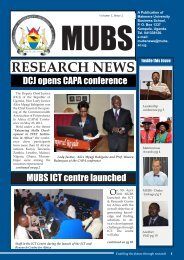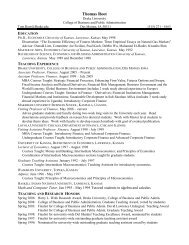13th Annual International Management Conference Proceeding
13th Annual International Management Conference Proceeding
13th Annual International Management Conference Proceeding
Create successful ePaper yourself
Turn your PDF publications into a flip-book with our unique Google optimized e-Paper software.
� Innovators<br />
� Leaders<br />
� Independent<br />
� Creators<br />
� Aggressive<br />
� Energetic<br />
� High drive<br />
The term "entrepreneurship" comes from the French verb "entreprendre" and the German word<br />
"unternehmen," both, which mean to "undertake." The Merriam-Webster Dictionary presents the definition<br />
of an entrepreneur as one who organizes, manages, and assumes the risks of a business or enterprise.<br />
Filion (2000) in his article “From Entrepreneurship to Entreprenology” states that more than 1000<br />
publications now appear annually in the field of entrepreneurship, at more than 50 conferences and in 25<br />
specialized journals. Researchers tend to perceive and define entrepreneurs using the premises of their own<br />
disciplines. For example, the economists have associated entrepreneurs with innovation, whereas the<br />
behaviourists have concentrated on the creative and intuitive characteristics of entrepreneurs. However,<br />
Schumpeter really launched the field of entrepreneurship, by associating it clearly with innovation. He stated<br />
that:<br />
The essence of entrepreneurship lies in the perception and exploitation of new<br />
opportunities in the realm of business ... it always has to do with bringing about a<br />
different use of national resources in that they are withdrawn from their traditional<br />
employ and subjected to new combinations (Schumpeter, 1928).<br />
Not only did Schumpeter associate entrepreneurs with innovation, but also his imposing work showed the<br />
importance of entrepreneurs in explaining economic development. From this standpoint, the economists<br />
viewed entrepreneurs as "detectors" of business opportunities, creators of enterprises and risk-takers. They<br />
also showed that the role of entrepreneurs was to inform the market of new elements. They showed that<br />
entrepreneurs assumed a risk because of the state of uncertainty in which they worked, and that they were<br />
rewarded accordingly by the profits they made from the activities they initiated. They have a higher level of<br />
tolerance that enabled the entrepreneurs to work in conditions of ambiguity and uncertainty (Filion 2000).<br />
One of the criticisms that can be levelled at the economists is that they have not been able to make economic<br />
science evolve. They have also been unable to create a science of the economic behaviour of entrepreneurs.<br />
The economists' refusal to accept non-quantifiable models clearly demonstrates the limits of this science in<br />
entrepreneurship. In fact, it was one of the elements that led the world of entrepreneurship to turn to the<br />
behaviourists for more in-depth knowledge of the entrepreneur's behaviour.<br />
The term "behaviourists" includes the psychologists, psychoanalysts, sociologists and other specialists of<br />
human behaviour. The behaviourists’ movement had a goal to define entrepreneurs and their characteristics.<br />
Generally, behaviourists view entrepreneurs as innovators, independent people whose role as business leaders<br />
convey a source of formal authority. McClelland (1971), one of the behaviourists, defined an entrepreneur as<br />
someone who exercises control over production that is not just for his personal consumption. Thousands<br />
of publications describe a whole series of entrepreneurial characteristics. The most common are shown in<br />
Table 1.<br />
Table 1 Some Characteristics most often attributed to entrepreneurs by behaviorists<br />
� Tenacious<br />
� Original<br />
� Optimistic<br />
� Results-oriented<br />
� Flexible<br />
� Initiative<br />
� Learning<br />
� Resourceful<br />
� Need for achievement<br />
� Moderate risk-takers<br />
� Self-awareness<br />
� Long-term involvement<br />
� Tolerance of ambiguity<br />
and uncertainty<br />
44<br />
� Problem solving ability<br />
� Use of resources<br />
� Sensitivity to others<br />
� Tendency to trust people<br />
� Money as a measure of<br />
performance<br />
� Self-confidence<br />
Source: Kibas and K’Aol (2004), Bird (1989), Hornaday (1982), Meredith, et al. (1982), Timmons (1978)<br />
All this research produced highly variable and often, contradictory results. For example, although risk<br />
bearing is an important element of entrepreneurial behaviour, many entrepreneurs have succeeded by<br />
avoiding risk where possible and seeking others to bear the risk. Likewise, creativity is often not a<br />
prerequisite for entrepreneurship either. Many successful entrepreneurs have been good at copying.


